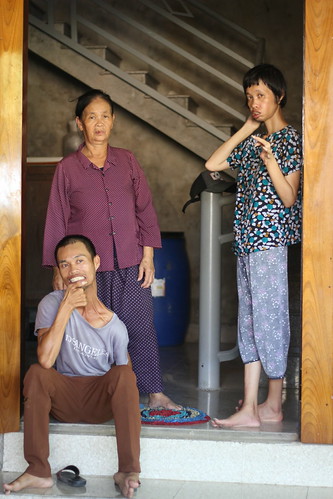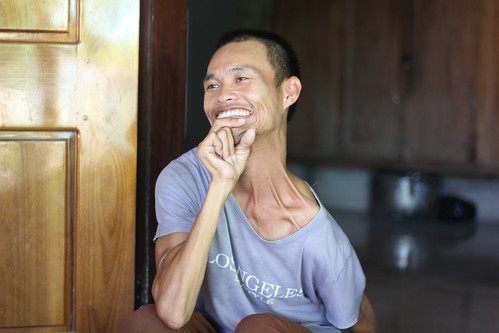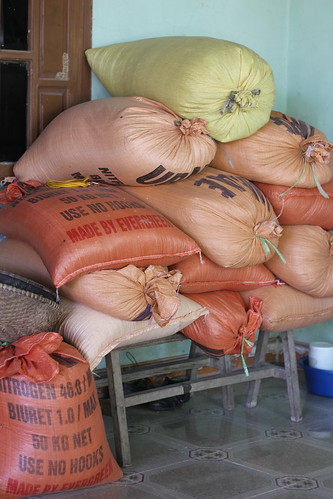Mr. Phan That’s family is the Agent Orange Campaign’s eighth beneficiary! Their family was the first of three beneficiaries to officially implement their business plan in 2018.
Ms. Que, Pham Thi Linh (daughter), and Pham Van Linh (son) pose for a portrait.
We visited Mr. That’s family on an exceptionally hot Wednesday afternoon. We spoke with Ms. Hoang Thi Que (his wife) while he was out working in the fields and feeding the cow and calf. Mr. Thuan (Outreach Worker) seemed a little surprised that Mr. That was not available but we all understood that their livelihood will and should take precedence over a visit.
Unlike other visits, however, this one felt rushed and almost foreboding. Perhaps, it was the result of the unrelenting heat and the sum of our fatigue, or learning about the difficult situations they are confronted with, or it was, more plainly, a meeting between persons who are still building a rapport (see Jacob’s post for his initial interactions with the That family), or all of these things combined, or none.
This is not to say though, that the meeting went badly or Ms. Que wasn’t the epitome of a kind host because she most certainly was. She went out of her way to set up a table and chairs so that we could all sit and chat but throughout the conversation, even within her patient answers and explanations, I could feel a subtle hint of distress and mild irritation in her voice.
Pham Van Linh (32 years old) sits nearby and listens in on our conversation. He flashes a big smile in our direction every so often. Ms. Que explains that he is friendly with and curious about new visitors. (Pham Thi Linh, his sister, does not like visitors and remains inside the house for most of our visit.) Ms. Que and Mr. Thuan believe that they will gradually become used to “outsiders” in time (like many of our other beneficiaries’ children).
Ms. Que and Mr. That face great challenges (now and in the future): they are aging persons with disabilities responsible for caring for their adult children that have been severely affected by Agent Orange. Pham Thi Linh (38 years old) and Pham Van Linh (32 years old) are their daughter and son, respectively, that have dioxin-related mental disabilities so severe they depend on their parents entirely. Although both Thi Linh and Van Linh are in good health, they cannot support the family in any capacity. Ms. Que and Mr. That depend on neighbors and their other daughter, Luyen, for any additional support.
Coupled with this, Ms. Que shares, is her husband’s declining health condition. Mr. That had severe problems with his lungs a few months prior and went to Dong Hoi’s provincial hospital for a consultation. Two months ago the problems worsened and he almost passed away. The doctors have advised him to seek help in Hanoi but the family cannot bear additional economic burdens at this time.
Ms. Que is worried for her husband’s health and for her household. They had to get a loan of 40M VND (approximately $1,700 USD) from the local Women’s Union to pay for his treatment and are now in significant debt. Depending on market value, the couple plans to sell the cow or calf to repay the loan in part.
In addition to this, the family had to hire someone to help them harvest rice this year. This was an expense they had not anticipated as they are usually able to work the fields themselves. The rice they farm is strictly for consumption and the harvest lasts all year.
The rice pictured in the bags are harvested from the family’s rice field; it is used strictly for their consumption and lasts them all year. Ms. Que is proud to show us this year’s harvest perched on their front porch.
Nonetheless, Ms. Que is still hopeful and proud to show us the large bags of rice they have collected in 2018. She reminds us that in addition to the cow or calf sale, the family still raises fish for income and that it is going well with the help of the cow’s manure as fish food. Despite the adversity they face, the That family has developed a sustainable cycle of income generation and consumption that they are comfortable and confident with. We look forward to strengthening our relationship with them and supporting them for years to come.
Posted By Marcela De Campos (Vietnam)
Posted Oct 3rd, 2018




